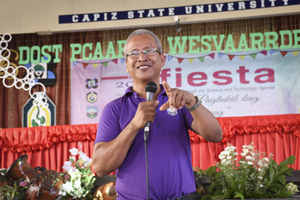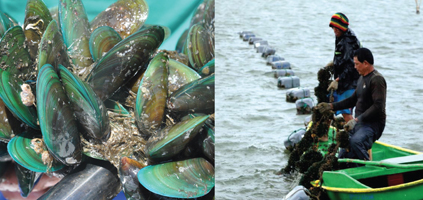
Dr. Diony I. Cahilig, Dean of the College of Fisheries, Capiz State University, presented two innovations on green mussel production - the raft and the longline methods.
The innovations are a departure from the stake method, which continuous use, causes siltation in the seabed.
These innovations, aside from being environment friendly, boast of other advantages. They are resilient and can stand strong wind. The methods have also shown better growth and survival rate.
The raft method uses one-meter growout ropes hanging from a raft. Each rope can hold up to 15 kilograms of mussels.
The longline method, also referred to as the Pinoy longline, being a modification of the same method used in other countries, uses a 50-meter main line. The line is supported by buoys on both ends and anchored by cement at the bottom of the seabed. Two-meter dangling ropes hang on the main line, which can contain up to 200 pieces of mussel spats.

Dr. Cahilig presented the innovations during the Western Visayas Agriculture, Aquatic and Natural Resources Research and Development Consortium’s (WESVAARRDEC) Farms and Industry Encounters through the Science and Technology Agenda (FIESTA) at the Capiz State University, Roxas City, from April 8-10, 2019.
Held as a pre-event activity for the annual Capiztahan, the WESVAARRDEC FIESTA meets the concept of the event-based modality -an event within a big event.
